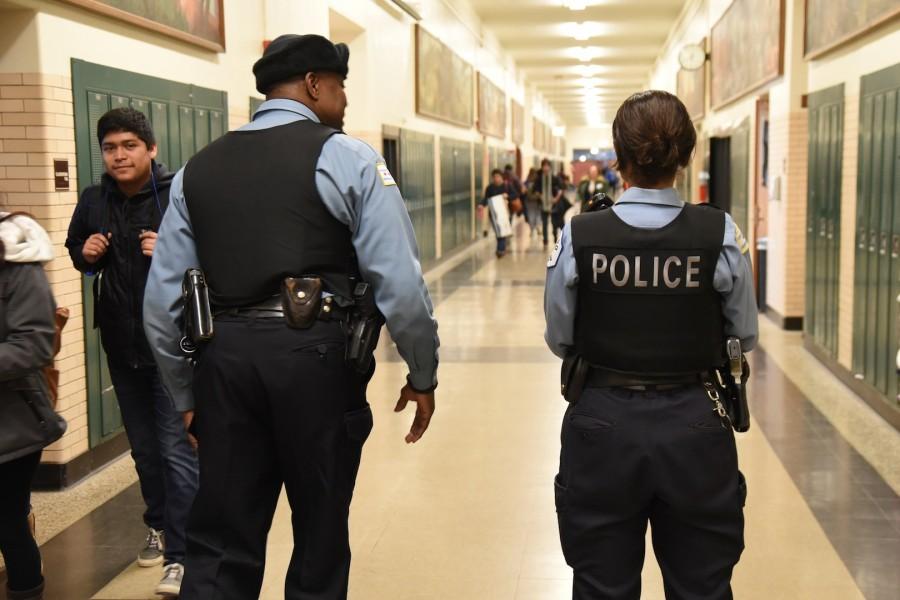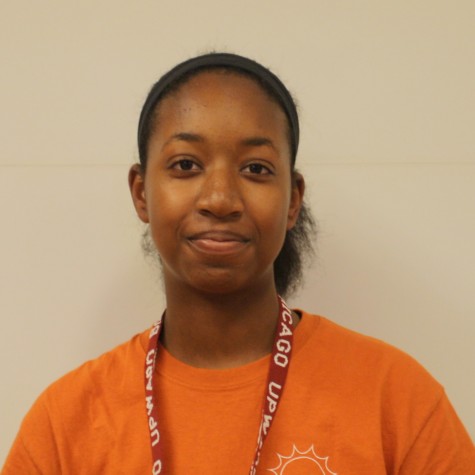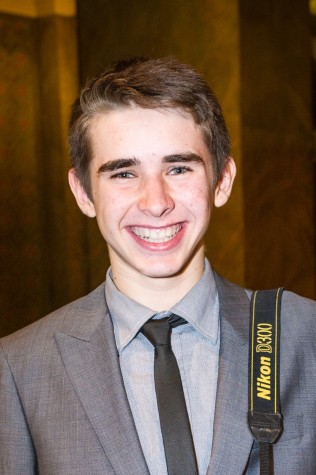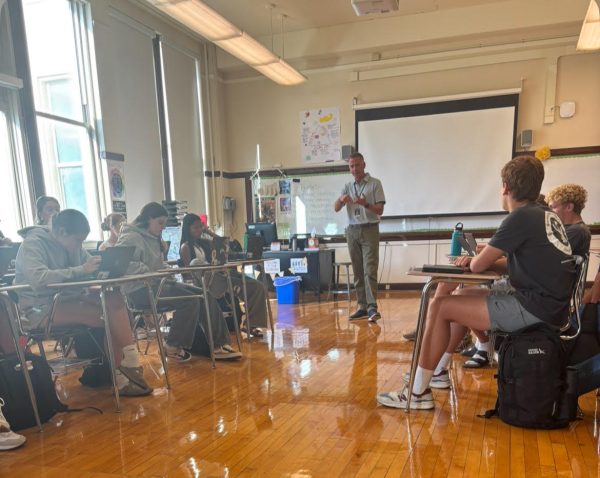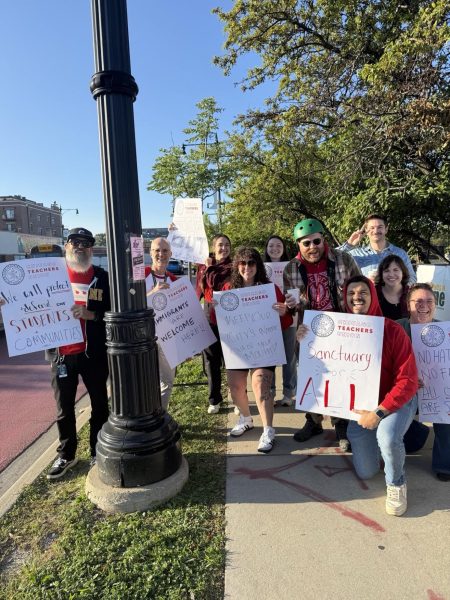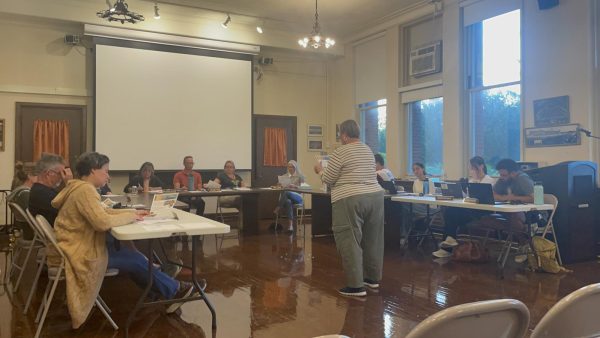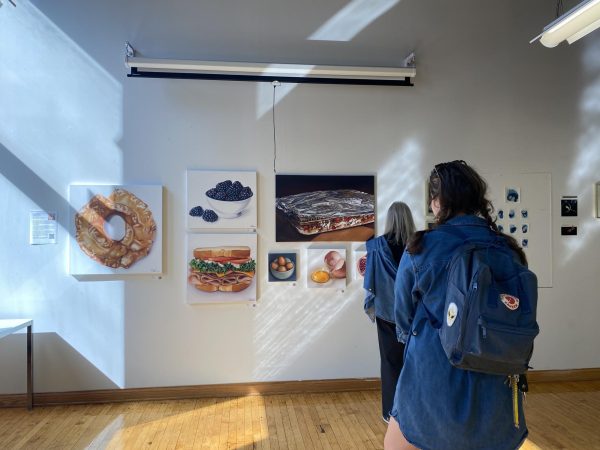Changing perceptions toward Chicago Police Officers
Officer Baughns, left, and Officer Hamad patrol the school halls to keep students protected.
According to a 2013 study conducted at UIC, the police in America are heavily dependent on the cooperation and support of citizens to achieve success in the performance of their duties.
Without public support, the police are very limited in their ability to solve known crimes, alleviate neighborhood problems, maintain order, build crime prevention partnerships, and maintain taxpayers’ support for budget requests.
People need to be able to trust fellow police officers, but now that trust has slowly decreased as the media reveals numerous cases of misconduct from the police.
The misconduct that is taking place only counts for a small percentage of police officers, but in many people’s minds it counts for all officers. Michelle Alexander, the author of the widely renowned book “The New Jim Crow” believes that these instances take place because of racial profiling, which leads to the term the new Jim Crow.
The Jim Crow law, which began in the 1880s, stated that all public facilities were to be separate but equal. Realistically, it was far from the truth. The public facilities that were designated for black people were greatly deformed and hideous, such as the dirty water fountains and bathrooms, whereas the white designated areas were clean and functioning properly.
As stated by Alexander, The new Jim Crow describes how mass incarceration today serves the same purpose as pre-Civil War slavery and the post-Civil War Jim Crow laws, which was to maintain a racial caste system. Jim Crow and slavery were caste systems, and our current system of mass incarceration is also a caste system, ‘The New Jim Crow’, according to Alexander.
The original Jim Crow laws, after slavery ended, promoted racial discrimination in public housing, employment, voting, and education. The powerful Civil Rights struggles of the 1950s and 1960s were seen as the end of the Jim Crow with the passage of the Civil Rights Act of 1964 and the Voting Rights Act of 1965. However, according to Michelle Alexander demonstrates that the racial caste system has not ended, it has simply been redesigned.
Some police officers use their biases by the practice of excessive force, as seen in the media and read in newspapers. However, many officers do not input their emotions during their jobs. Officer Hamad, one of the two police officers who work in Lane, reflects on this.
“I try not to incorporate my emotions, but it’s close to impossible when it comes to children and death. Most officers tend to keep it separate so they’re not carrying it around with them,”Hamad said. “If an officer uses their emotion, it can make a negative impact on how they handle the arrest. Using their emotions becomes detrimental to their job.”
Officers are supposed to represent a form of trust, for students and adults to go to them in a time of need. Unfortunately, this is not the case for some.
Toni Taylor, Div. 770, said, “I don’t trust police. I feel that many are biased about the color of our [brown] skin.”
The perception of police officers also changes with different neighborhoods and ethnicities. According to data compiled from a 2013 Reason-Rupe public opinion survey, 80 percent of white people have a positive view of the police, while 52 percent of black people have a positive view, and 51 percent of Latino people have a positive view on the police force.
The vast difference of trust between white citizens and minorities is drastic, because most, if not all, of the reports of police misconduct deals with the victims being minorities. And these minorities are afraid to make contact with a police officer.
“I’m not afraid to approach the police,” Taylor said. “I know my rights, and if I did anything wrong or not.”
The techniques that police officers are supposed to use defuse situations is to assess the situation and stay calm but authoritative. According to FindLaw, one universal rule police officers must follow is that they are not allowed to use excessive force or treat the arrestee cruelly. Police officers are only allowed to use the minimum amount of force they need to protect themselves and to bring the suspect into custody, which is why people are advised to never resist an arrest or argue with police. The more struggling that happens, the more force is required for the police to do their job. If the arrestee thinks the arrest is unjustified or incorrect, they can always challenge it later and make a Civil Rights lawsuit.
Officer Ronald Baughns, a police officer at Lane, uses a technique to calm both parties down.
“The most important technique is to listen, take both sides of the story, and think about the best thing to do,” Baughns said. “I practice patience.”
Police officers have a job to do, which is to serve and protect citizens. But without public support, officers are hindered from doing their job.
Your donations directly fund the Lane Tech student journalism program—covering essential costs like website hosting and technology not supported by our school or district. Your generosity empowers our student reporters to investigate, write, and publish impactful stories that matter to our school community.
This website is more than a publishing platform—it's an archive, a research tool, and a source of truth. Every dollar helps us preserve and grow this resource so future students can learn from and build on the work being done today.
Thank you for supporting the next generation of journalists at Lane Tech College Prep!

